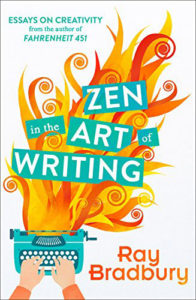

Remember that pianist who said that if he did not practice every day he would know, if he did not practice for two days, the critics would know, after three days, his audiences would know. If you find this post a little too quote heavy, please let me know in the comments below so that I can adjust for future posts! Here are 12 lessons I learned from Zen in the Art of Writing by Ray Bradbury: 1. Write as often as you can. I did this with the intention of allowing Bradbury to explain exactly what he means, rather than paraphrasing things that already made perfect sense in the original. For several topics, Bradbury gives an excellent explanation, so I have opted to share more quotes where it seemed appropriate (particularly lesson #6 and onward). You might notice that there are a lot of quotes below. A balanced mixture of biography and instruction, this book has a lot to offer in terms of lessons you can incorporate into your own writing. He describes his creative process and gives background on how several of his stories came to exist.

This is not a tome on the craft of writing written by some professor it is a love note about the passion Bradbury felt and wanted the world to share throughout his career.Zen in the Art of Writing: Essays on Creativity is a collection of essays written by Ray Bradbury on the topic of writing. The reader knows that he is reading something special. Bradbury's passion is undisguised and cannot be missed by the reader who glides through the pages.

Words are not put on paper, they dance out of the mind and explode into the world.įew books convey such passion, such love of craft as does this collection of essays Bradbury published over several years. heaven is not a place reserved for the afterlife but the experience of telling a story well and finding pleasure in the mere telling of it. Just as "a man who does what he loves for a living will never have to work a day in his life," so to the writer who writes for the pure joy of doing it, because he is driven to put pen to paper, because he has stories that simply must be told, and because to not write would be unthinkable. For these, writing is a surrender to an unquenchable passion, a tribute to a deep seated drive, an acknowledgement that writing is fulfillment, not simply a job or craft. As Bradbury points out in the closing chapter of this book, some writers write in order to make money, and some others write in order to achieve recognition and accolades, but the best writers write as a response to their own inner calling.


 0 kommentar(er)
0 kommentar(er)
